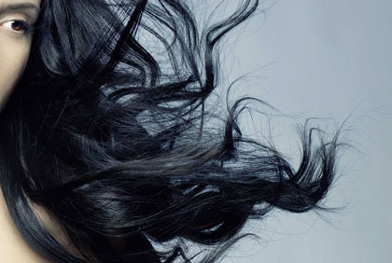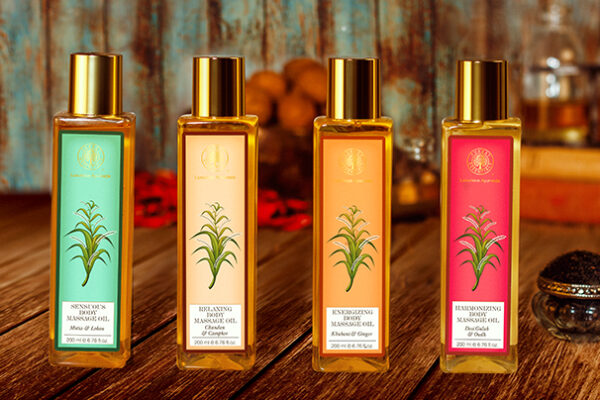Imagine if every day could be a good hair day. Your hair looks lustrous, shiny, and healthy each time you step out. This might sound too good to be true, but with the right routine based on your hair type, you can permanently bid goodbye to your worst hair nightmares. Here is the ultimate guide to haircare, curated by team Forest Essentials, with hair protection tips that you have been missing out on, to get the hair of your dreams.
Haircare According to Ayurveda
Ayurveda follows a holistic approach to hair care. According to this, Vata (Air), Pitta (Fire/Heat), and Kapha (Water & Earth) are the three energies that are responsible for your body’s overall well-being.
When identifying your hair type, you must differentiate your ‘Prakriti’ which is your unique constitution, from your ‘Vikriti’, which comprises any imbalances that you might experience. If you are born with naturally straight or naturally curly hair, that becomes your Prakriti. If your hair starts thinning and becomes limp over time, then these changes can be attributed to Vikriti.
These imbalances can be fixed with a proper regime and haircare tips based on your Dosha type.

Haircare Regime for Vata Dosha
If Vata is your dominant Dosha, your hair is likely to be thin, and straight, and have a higher ability to absorb moisture. It may also be slightly curly, and the texture is usually normal to dry. If there is an imbalance in your dosha, you may experience extreme thinning of hair, dandruff, and frizz.
To restore balance, your weekly hair care routine should involve nourishing your hair with oils. The best-suited oils for the Kapha dosha are Almond Oil and Castor Oil. To cleanse and condition you can opt for hair care products infused with Bhringraj & Shikakai. Revered as the ‘King of Hair’, Bhringraj promotes hair growth while also strengthening and nourishing the hair.
In addition to topical remedies, as your diet can influence the way your body functions and responds, make sure you incorporate foods that are high on the salty, sour, and sweet flavour profiles, in your daily meals.
Haircare Regime for Pitta Dosha
If your Dosha type is Pitta, your hair is typically normal to slightly wavy, fairly thick, and moderately strong. When the Pitta is aggravated, one may experience premature greying and thinning of hair. To correct this, a natural cleanser & conditioner infused with pitta-balancing herbs including Japapatti & Brahmi is recommended. You can also include the Intensive Hair Repair Masque once a week in your regimen to provide deep nourishment to your hair.
One of the best haircare tips that all our Mums will swear by is the egg whisk! Take a small quantity of the hair masque in a bowl and whisk a whole egg into it. Apply this to the lengths of your hair and leave it on for 30 minutes. You may also indulge in a head massage with Virgin Coconut Oil before applying the masque. Let the oil seep into your roots while the masque gives the strands that extra TLC.
To further pacify the Pitta dosha, you should avoid foods that are spicy and follow a diet that subdues the digestive fire.
Haircare Regime for Kapha Dosha
If you have hair that is thick, lustrous, strong, and straight, then your dominant Dosha is likely to be Kapha. An imbalance of the Kapha Dosha can lead to oil secretion which in turn can cause dandruff. A natural cleanser that contains Reetha will help remove impurities without stripping the scalp of its natural oils. Hair care products infused with ingredients including Shikakai and Neem are also recommended for Kapha Dosha types.
Apart from following a haircare regime most suited to your Dosha type, you may also include the following practices to maintain good hair health.

Indulging in Shiro Abhyanga
As a best practice, Ayurveda recommends applying Sesame Oil as part of your weekly routine to prevent thinning of hair while also retaining its natural hair colour. Shiro Abhyanga or ‘Head Massage’ boosts hair growth and is perfect to provide deep nourishment to your hair.
Hair care for dry hair includes scalp nourishment with herb-enriched oils. Some are recommended below:
- Coconut Oil
- Almond Oil
- Amla Oil
- Thyme & Rosemary Oil
- Japapatti Oil
- Bhringraj Oil
You can also use these with a combination of other effective ingredients including Neem and Lemon if you are experiencing an itchy scalp.

Practicing Nasya
Nasya therapy involves the instillation of oils through the nasal route. If practiced daily, this can help delay the greying of hair, while also minimising hair fall.
Incorporating Dhumpana into your Daily Routine
Indulging in the practice of inhaling medicated fumes or Dhumpana as part of your daily routine can help with alopecia (hair fall), greying of hair and can also help strengthen your hair.

Shirodhara
The Ayurvedic practice of Shirodhara involves pouring warm medicated oil over the forehead. This process minimises hair fall and helps with dry scalp and hair. Typically practiced for a duration of 30 minutes to an hour.
Shirodhara is a great way to introduce a moment of calm in your weekly regime while letting your hair reap all the exceptional benefits. Practicing this 1-2 times a week can help treat dry & limp hair effectively.

Home Remedies | Hair Care for Oily Hair:
If you are experiencing hair fall, you can whip up a quick hair masque with Gokshur, Til, Honey, and Cow’s Ghee at home. Apply it to the scalp and leave it on for 15 to 20 minutes.
To cleanse, you can either opt for a natural hair cleanser or you can make your own by mixing equal quantities of Reetha, Amla, Bhringraj, Shikakai, and Hibiscus into a powder.
FAQs:
What are the best hair care tips for healthy and beautiful hair?
Hair care tips can vary depending on your hair type. Some best practices that you can incorporate into your daily haircare routine are opting for natural hair cleansers and conditions, applying hair masques (these may be DIY or store-bought) weekly, minimising the use of heating irons to style your hair, and massaging the scalp with oil at least once a week.
What are some common hair protection tips?
- Let your hair air dry as much as possible and avoid combing your hair when wet.
- Choose natural hair care products.
- Do not skip the conditioner.
- Oil your hair regularly.
- Use a hair protectant before styling your hair.
- Minimise the use of hair colour.
How often should I wash my hair?
The ideal number of times that you should wash your hair depends on your hair type. If you are someone who has oily hair, you can wash it daily, and if your hair is normal to dry, then it is recommended to wash your hair 2 to 3 times a week.
What are the best hair care products for different hair types?
There is no dearth of hair care products in the market. So, choose cleansers and conditioners that are designed to tackle your hair care concerns.
To maintain the health of your hair and prevent damage, natural haircare products are the general recommendation. If you are experiencing dandruff and hair fall, then opt for a cleanser and conditioner infused with Bhringraj & Shikakai. For dry and damaged hair, an Amla, Honey & Mulethi infused cleanser and conditioner duo is ideal. For chemically treated hair you can opt for a cleanser and conditioner prepared with ingredients including Japapatti & Brahmi.
How can I prevent split ends and breakage?
Getting your hair trimmed regularly, minimising the use of hair colour, and limiting the use of styling tools can help prevent split ends and breakage. You can also oil your hair on a regular basis and opt for natural cleansers and conditioners instead of harsh, chemically propelled shampoos to cleanse and nourish. You can also incorporate a weekly hair masque into your regime.
What are some hair care tips for oily hair?
Find a balance between how often or how less you wash your hair. If excess oil isn’t removed properly, then it can leave your hair and scalp oily. This may require you to wash your hair more often, even daily. But washing hair too often can also strip off the natural & good oils, which may lead to more oil production. You can also incorporate ingredients including Green Tea and Coconut in your hair care regime to keep the hair grease-free.
What are some hair care tips for dry and damaged hair?
- For dry and damaged hair, you can opt for a natural cleanser and conditioner infused with Amla, Honey & Mulethi.
- You can apply a hair masque along the lengths of your hair weekly, to repair and nourish. You can also use a Hair Vitalizer to strengthen your hair and control hair fall.
- Massaging your scalp with oil in circular motions increases the blood flow, which in turn helps strengthen your hair.
References:
Tips for healthy hair (aad.org)
22 Things to Know to Create the Best Care Routine for Your Hair Type (healthline.com)













